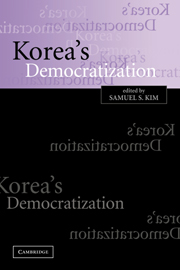Book contents
- Frontmatter
- Contents
- Tables and Figures
- Contributors
- Preface
- Part I A Framework of Analysis
- Part II Consolidation at the Mass Level
- Part III Consolidation at the Civil Society Level
- 3 Civil Society in Democratizing Korea
- 4 Redrafting Democratization Through Women's Representation and Participation in the Republic of Korea
- 5 Korean Nationalism, Anti-Americanism, and Democratic Consolidation
- Part IV Consolidation at the State Level
- Bibliography
- Index
3 - Civil Society in Democratizing Korea
Published online by Cambridge University Press: 29 July 2009
- Frontmatter
- Contents
- Tables and Figures
- Contributors
- Preface
- Part I A Framework of Analysis
- Part II Consolidation at the Mass Level
- Part III Consolidation at the Civil Society Level
- 3 Civil Society in Democratizing Korea
- 4 Redrafting Democratization Through Women's Representation and Participation in the Republic of Korea
- 5 Korean Nationalism, Anti-Americanism, and Democratic Consolidation
- Part IV Consolidation at the State Level
- Bibliography
- Index
Summary
Civil Society and Democratization in Korea: An Overview and a Puzzle
Korean democratization defies easy classification and presents a unique challenge to students of comparative politics. Unlike some cases in Southern Europe and Latin America, what happened in Korea in 1987 was not really a “pacted” transition – a democratic transition that is centered around and determined by elite calculations and interactions. That there was a fatal tension and split between the hard-liners (e.g., Chun Doo Hwan) and the soft-liners (e.g., Roh Tae Woo) in June 1987 is a plausible but very dubious claim considering the circumstances preceding and following the democratic transition.
On the other hand, democratization in Korea was not an earthshaking revolution, unlike some cases in Eastern Europe. Although the June Uprising in 1987 and the ruling party's eight-point democratization package were in large measure a response to such an unprecedented “popular upsurge,” what happened afterward was far from a handsome victory for the insurgents. The eventual conclusion of the 1987 “revolution” was incredibly anticlimactic. The ruling party candidate, who was one of the coconspirators of the 1979–80 multistaged military coup and a key partaker in Chun's highly authoritarian rule, was elected president in December 1987. Neither the elites nor the masses “won” democracy in Korea; rather, what fundamentally characterized Korean democratization and differentiated it from other cases of the “third wave” of global democratization was the protracted and intense conflict between a strong civil society and a strong state.
- Type
- Chapter
- Information
- Korea's Democratization , pp. 81 - 106Publisher: Cambridge University PressPrint publication year: 2003
- 10
- Cited by



